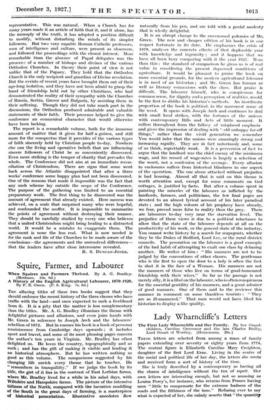Squire, Farmer , and Labourer
When Squires and Farmers Thrived. By A. G. Bradley. (Methuen. 10s. 6d.)
ThE alluring titles of these two books suggest that they
should embrace the recent history of the three classes who have traffic with the land—and once expected to suck a livelihood
from it. at is a pity that the matter is less complementary than the titles. Mr. A. G. Bradley illumines the, theme with delightful pictures and allusions, and even joins hands with Mr. Green in reference to Joseph Arch and the labourers' rebellion of 1872. But in essence his book is a book of personal reminiscence from Cambridge days upwards ; it includes sport and travel, and some of its most pleasing pages concern the author's ten years in. Virginia. Mr. Bradley has often delighted us. He loves the country, topographically and as such ; and has the gift of making it visible and lending it an historical atmosphere. But he has written nothing so good as this volume. The comparisons suggested by his changing life enrich every theme that he touches. He " remembers in tranquillity." If we judge the book by its title, the gist of it lies in the contrast of East Lothian farms,
where Mr. Bradley lived for a while in his salad days, with Wiltshire and Hampshire farms. The picture of the intensive
tidiness of the North, compared with the lucratiVe muddling of the South in the great days of farming, is a masterpiece of historical preientation. Illustrathie anecdotes flow
naturally from his pen, and are told with a genial modesty that is wholly delightful.
It is an abrupt change to the envenomed polemics of Mr. Green. The new and cheaper edition of his book is in one respect fortunate in its date. He emphasizes the crisis of 1879, analyses the concrete effects of that deplorable year with knowledge and ingenuity ; and it happens that we have all been busy comparing with it the year 1927. More than this : the standard of comparison he gives us is of real value in considering the present depressed conditions of agriculture. It would be pleasant to praise the book on more essential grounds, for the modern agricultural labourer is in need of an historian ; and Mr. Green has human as well as literary connexions with the class. But praise is difficult. The labourer himself, who is conspicuous for common sense, for dignity and a perception of realities, would be the first to dislike his historian's methods. An inordinate proportion of the book is political, in the narrowest sense of the word. It opens with Joseph Arch and continues to deal with small local strikes, with the fortunes of the unions. with contemporary Bills and Acts of little moment. It suffers throughout from the fallacy of misplaced emphasis and gives the impression of dealing with " old unhappy far-off things," rather than the vivid generation we remember You would infer that the unions were amazingly strong and increasing rapidly. They are in fact notoriously and, some of us think, regrettably weak. It is a perversion of fact to argue that the landlord was the chief enemy of the minimum wage, and his record of wage-rates is largely a selection of the worst, not a confession of the average. Every allusion to enclosures suffers from historical blindness to one aspect of the operation. The one abuse attacked without prejudice is bad housing. Almost all that is said on this theme is worth attention and, except for some comments on tied cottages, is justified by facts. But after a volume spent in painting the miseries of the labourer as inflicted by the landlords, farmers, and politicians, the few final pages are devoted to an almost lyrical account of his later paradisal state ; and the high colours of his prophecy have already, we fear, proved more false to reality than the grey. There are labourers to-day very near the starvation level. The prejudice of these views is due to a political reluctance to allow that the state of the labourer depends at all on the productivity of his work, or the general state of the industry. You cannot write history by a search for scapegoats, whether they be the Dukes of Bedford, Lord Lee, or the rural district councils. The peroration on the labourer is a good example of the bad habit of attempting to exalt one class by debasink another. He writes of him : " His manners are not to be judged by the conventions of other classes. The gentleman who is the first to open the door to a lady is often the first to shut it in the face of a Woman. His manners are not the manners of those who live on terms of good-humoured friendship with their wives." So far as the passage is not merely silly, it is a libel on the labourer, who is often conspicuous for the essential gentility of his manners, and a great admirer of good manners. One of them said to the reviewer this summer in comment on some thankless tourists : " They are so ill-mannered." That man would not have liked his historian to display a like quality.










































































 Previous page
Previous page